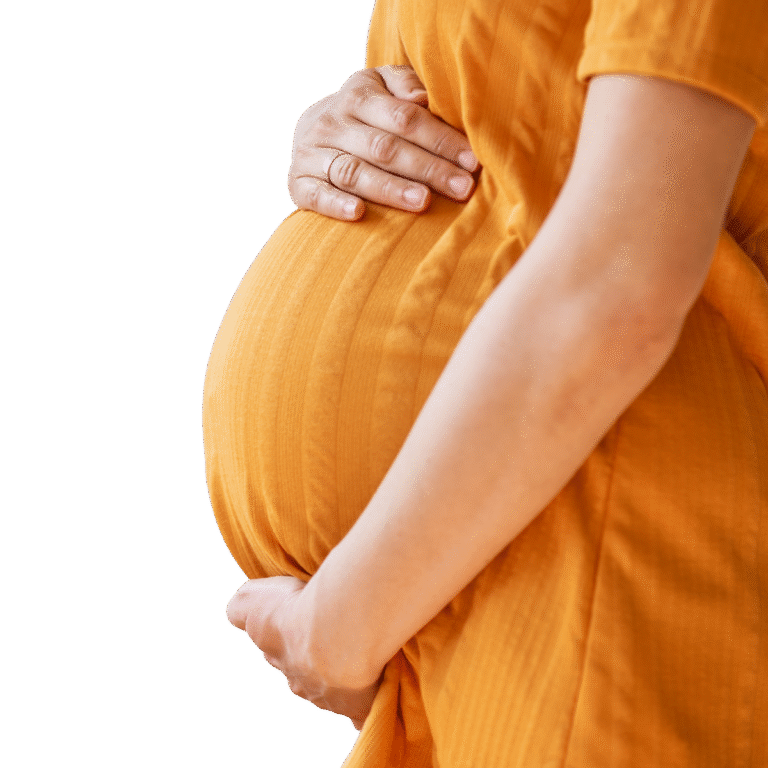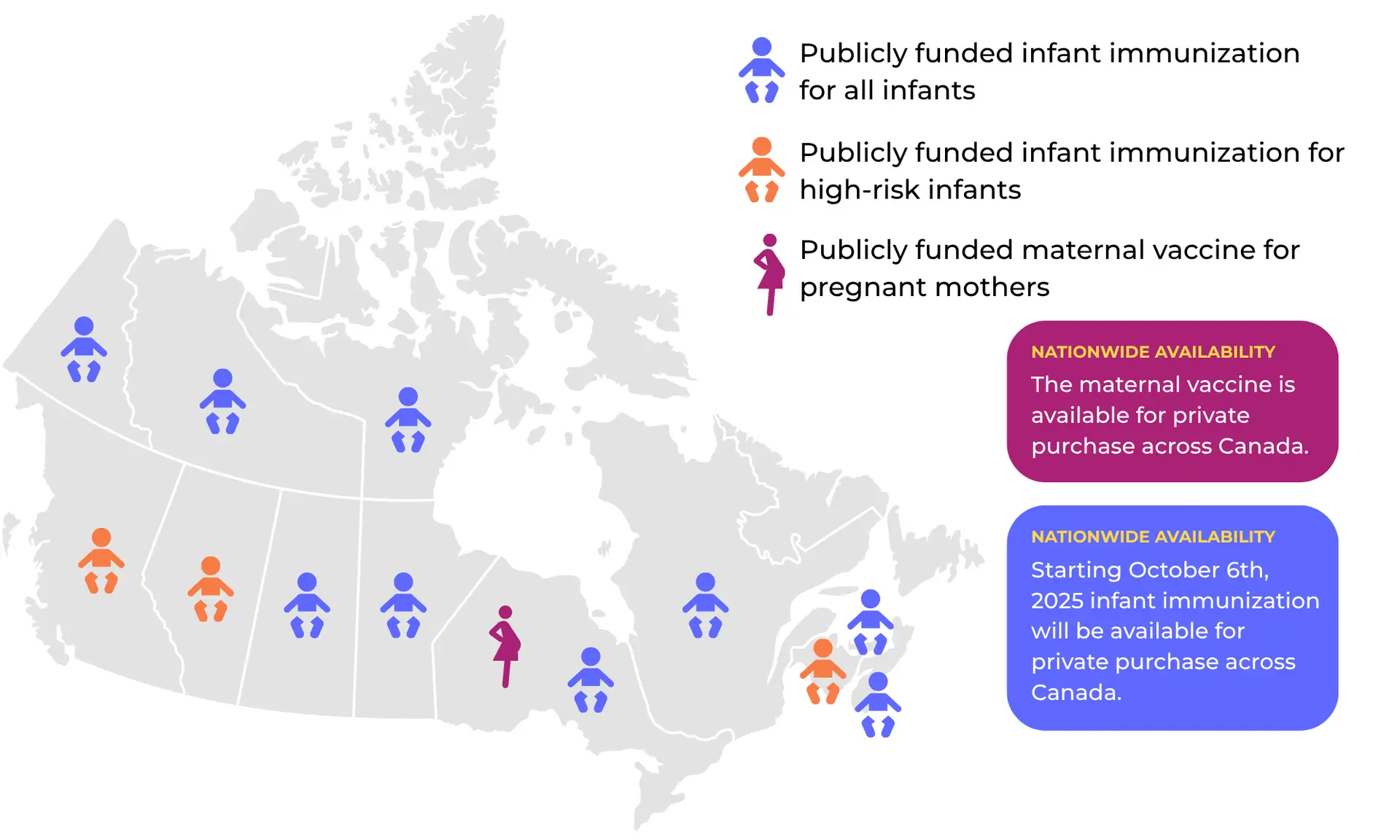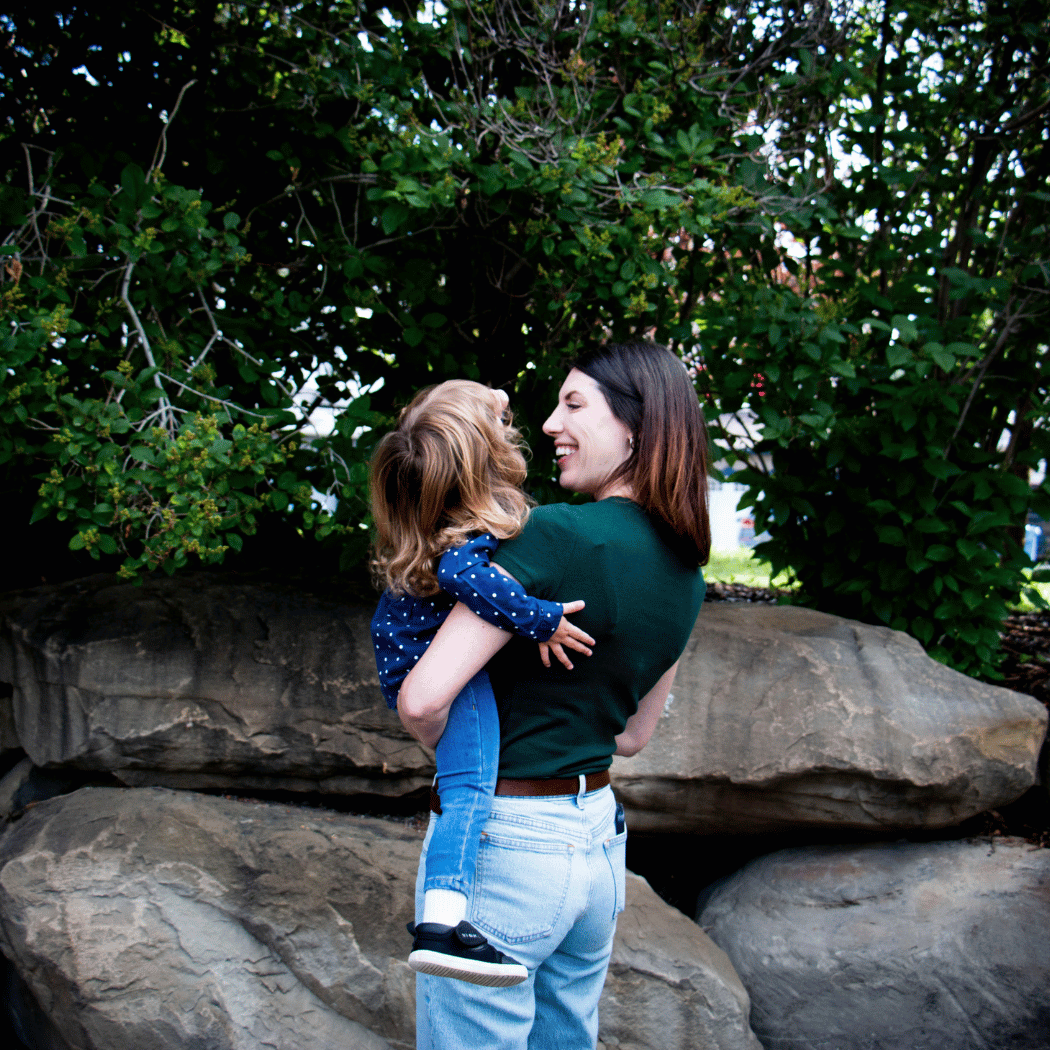RSV INFORMATION HUB
Prepared. From Day One.
What Parents Need to Know About RSV
Navigating RSV protection can feel overwhelming, especially during your baby’s first cold and flu season.
This hub offers trusted resources from healthcare providers, answers to common questions, and guidance to help you understand the risks of RSV and explore options to help protect your family.

Why is RSV a concern for babies?
-
developing lungs & immune systems
RSV can be more serious for babies—especially those born premature or with weaker immune systems—because their lungs and immune systems are still developing.
-
Leading cause of hospitalization
In Canada, RSV is the leading cause of hospital visits for infants with lung infections, like bronchiolitis or pneumonia.
-
Long-term health impacts
Having an RSV infection as an infant can lead to long-term health issues, like a higher risk of asthma, later in childhood.
What is RSV?
RSV (respiratory syncytial virus) is a common virus that infects the lungs and airways. Most children will have RSV by the time they’re two. In healthy adults and older kids, it usually causes mild, cold-like symptoms — but in babies, it can lead to serious illness.
In Canada, around 2% of infants are hospitalized with RSV in their first year. In some remote communities, this can rise to 5–17%.
Fortunately, there are options to help lower the risk during RSV season.
RSV Protection Options
In Canada, families have two options to help protect babies during their first RSV season.
RSV Immunization for Babies
Depending on when they are born, babies can receive the RSV immunization either shortly after birth or at the start of RSV season.
It may also be offered to babies up to 24 months old entering their second RSV season, who are at a higher risk of serious illness from RSV—such as those born prematurely or with certain medical conditions.
How does it work?
This immunization is a single dose that gives the baby ready-made antibodies to help recognize and fight RSV. Because it doesn’t rely on the baby’s immune system to build protection, it begins working right away after it’s given to help reduce the risk of severe RSV illness.
RSV Vaccine for Pregnant Mothers
During RSV season, pregnant mothers can receive the RSV vaccine between 32 and 36 weeks of pregnancy.
How does it work?
This vaccine is given as a single dose and trains the mother’s immune system to produce RSV-fighting proteins called antibodies.
During the final weeks of pregnancy, the mother will pass these antibodies to the baby, which will help reduce the risk of severe RSV illness during the baby’s first RSV season.
Both options lower the risk of severe illness from RSV. The decision depends on factors, such as availability, timing (during pregnancy or after birth), and each family’s circumstances. Families can make informed decisions by discussing their options with a healthcare provider.
Provincial RSV Programs
RSV protection options and public funding vary across Canada.
The map below shows which RSV protections are publicly funded and which are available for private purchase in each province and territory.
rsv protection by province

Availability and funding are subject to change. Talk to a healthcare provider to discuss what options are best for you.
Learn more about RSV protection options in your province
Publicly Funded RSV Protection
The Alberta Pediatric RSV Prevention Program will offer RSV immunization to high-risk infants for the 2025-26 season. Eligible high-risk infants may be able to receive the immunization at no cost.
Visit MyHealth Alberta for information on accessing RSV protection or talk to a healthcare provider.
private purchase options
RSV Immunization for Babies: Starting October 6, 2025, the RSV immunization for babies will be available for private purchase across Canada with a prescription from a licensed healthcare provider. Some private insurances may cover the cost.
To access the infant immunization ask your healthcare provider for a prescription, pick up the immunization at your local pharmacy, and bring the immunization back to your healthcare provider for your baby’s appointment. Pharmacists can provide guidance on how to store and transport the immunization safely.
RSV Vaccine for Pregnant Mothers: The RSV vaccine for pregnant mothers can be purchased privately with a prescription from a healthcare provider. Some private insurances may cover the cost.
Links to provincial resources:
Advocacy
You are invited to use our letter-writing toolkit to help raise awareness about access to funding for RSV protection in Alberta.
Publicly Funded RSV Protection
BC will offer RSV immunization to infants at high-risk of RSV disease, including those who are very premature, have certain medical conditions, or live in eligible remote communities or congregate settings.
Contact your local public health unit or talk to a healthcare provider to learn more about available RSV protection options.
private purchase options
RSV Immunization for Babies: Starting October 6, 2025, the RSV immunization for babies will be available for private purchase across Canada with a prescription from a licensed healthcare provider. Some private insurances may cover the cost.
To access the infant immunization ask your healthcare provider for a prescription, pick up the immunization at your local pharmacy, and bring the immunization back to your healthcare provider for your baby’s appointment. Pharmacists can provide guidance on how to store and transport the immunization safely.
RSV Vaccine for Pregnant Mothers: The RSV vaccine for pregnant mothers can be purchased privately with a prescription from a healthcare provider. Some private insurances may cover the cost.
Visit HealthLink BC for up-to-date information, including a clinic locator to direct you to a pharmacy which carries the RSV vaccine for pregnant mothers.
Links to provincial resources
advocacy
You are invited to use our letter-writing toolkit to help raise awareness about access to funding for RSV protection in British Columbia.
Publicly Funded RSV Protection
The Saskatchewan RSV infant immunization program will be funding RSV immunization for all infants born one month before or during the RSV season. All infants born from October 1, 2025 to March 31, 2026 will be eligible to receive the immunization at no cost.
Contact your local public health unit or talk to a healthcare provider to learn more about available RSV protection options.
private purchase options
RSV Immunization for Babies: Starting October 6, 2025, the RSV immunization for babies will be available for private purchase across Canada with a prescription from a healthcare provider. Some private insurances may cover the cost.
To access the infant immunization ask your healthcare provider for a prescription, pick up the immunization at your local pharmacy, and bring the immunization back to your healthcare provider for your baby’s appointment. Pharmacists can provide guidance on how to store and transport the immunization safely.
RSV Vaccine for Pregnant Mothers: The RSV vaccine for pregnant mothers can be purchased privately with a prescription from a healthcare provider. Some private insurances may cover the cost.
Links to provincial resources
Publicly Funded RSV Protection
Manitoba is publicly funding the RSV infant immunization for all infants born between October 1, 2025 and March 31, 2026. In addition, infants and young children with certain high-risk conditions may also be eligible in consultation with the Manitoba High-Risk RSV Program.
Contact your local public health unit or talk to a healthcare provider to learn more about available RSV protection options.
private purchase options
RSV Immunization for Babies: Starting October 6, 2025, the RSV immunization for babies will be available for private purchase across Canada with a prescription from a healthcare provider. Some private insurances may cover the cost.
To access the infant immunization ask your healthcare provider for a prescription, pick up the immunization at your local pharmacy, and bring the immunization back to your healthcare provider for your baby’s appointment. Pharmacists can provide guidance on how to store and transport the immunization safely.
RSV Vaccine for Pregnant Mothers: The RSV vaccine for pregnant mothers can be purchased privately with a prescription from a healthcare provider. Some private insurances may cover the cost.
Links to provincial resources
Publicly Funded RSV Protection
Ontario is publicly funding RSV immunization for babies for the 2025–2026 season. All infants up to 8 months old and high-risk children up to 24 months, are eligible to receive the immunization at no cost.
Ontario will also fund the maternal RSV vaccine for pregnant residents between 32 and 36 weeks gestational age who are expected to deliver near the start or during the 2025-2026 RSV season.
Visit the Ontario RSV prevention program website to learn more or contact your local public health unit.
Links to provincial resources
Publicly Funded RSV Protection
Quebec is publicly funding RSV immunization for babies. All babies born during the 2025–2026 season can receive the immunization at no cost.
In addition, infants born on or after April 2, 2025, who are under 8 months old and entering their first RSV season, are also eligible for the publicly funded immunization. Visit the Quebec RSV immunization page for information about the publicly funded program.
Contact your local public health unit or talk to a healthcare provider to learn more about available RSV protection options.
Private Purchase Options
RSV Immunization for Babies: Starting October 6, 2025, the RSV immunization for babies will be available for private purchase across Canada with a prescription from a healthcare provider. Some private insurances may cover the cost.
To access the infant immunization ask your healthcare provider for a prescription, pick up the immunization at your local pharmacy, and bring the immunization back to your healthcare provider for your baby’s appointment. Pharmacists can provide guidance on how to store and transport the immunization safely.
RSV Vaccine for Pregnant Mothers: The RSV vaccine for pregnant mothers can be purchased privately with a prescription from a healthcare provider. Some private insurances may cover the cost.
Links to provincial resources
Private purchase options
RSV Immunization for Babies: Starting October 6, 2025, the RSV immunization for babies will be available for private purchase across Canada with a prescription from a healthcare provider. Some private insurances may cover the cost.
To access the infant immunization ask your healthcare provider for a prescription, pick up the immunization at your local pharmacy, and bring the immunization back to your healthcare provider for your baby’s appointment. Pharmacists can provide guidance on how to store and transport the immunization safely.
RSV Vaccine for Pregnant Mothers: The RSV vaccine for pregnant mothers can be purchased privately with a prescription from a healthcare provider. Some private insurances may cover the cost.
Contact your local public health unit or talk to a healthcare provider to learn more about available RSV protection options.
Links to provincial resources
Publicly Funded RSV Protection
New Brunswick is publicly funding RSV immunization for high-risk infants 6 months of age and younger in their first RSV season and children up to 24 months of age who are at increased risk of severe RSV disease.
All high-risk infants born after April 1, 2025 and high-risk infants up to 24 months of age can receive the immunization at no cost.
Contact your local public health unit or talk to a healthcare provider to learn more about available RSV protection options.
Private Purchase Options
RSV Immunization for Babies: Starting October 6, 2025, the RSV immunization for babies will be available for private purchase across Canada with a prescription from a healthcare provider. Some private insurances may cover the cost.
To access the infant immunization ask your healthcare provider for a prescription, pick up the immunization at your local pharmacy, and bring the immunization back to your healthcare provider for your baby’s appointment. Pharmacists can provide guidance on how to store and transport the immunization safely.
RSV Vaccine for Pregnant Mothers: The RSV vaccine for pregnant mothers can be purchased privately with a prescription from a healthcare provider. Some private insurances may cover the cost.
Links to provincial resources
Publicly Funded RSV Protection
Prince Edward Island is publicly funding RSV immunization for all infants in their first RSV season and for children up to 24 months of age who are at increased risk of severe RSV disease. All infants born in 2025 and high-risk infants up to 24 months of age can receive the immunization at no cost.
Contact your local public health unit or talk to a healthcare provider to inquire about RSV immunization options available for you.
Private Purchase Options
RSV Immunization for Babies: Starting October 6, 2025, the RSV immunization for babies will be available for private purchase across Canada with a prescription from a healthcare provider. Some private insurances may cover the cost.
To access the infant immunization ask your healthcare provider for a prescription, pick up the immunization at your local pharmacy, and bring the immunization back to your healthcare provider for your baby’s appointment. Pharmacists can provide guidance on how to store and transport the immunization safely.
RSV Vaccine for Pregnant Mothers: The RSV vaccine for pregnant mothers can be purchased privately with a prescription from a healthcare provider. Some private insurances may cover the cost.
Links to provincial resources
Publicly Funded RSV Protection
Nova Scotia is publicly funding RSV immunization for all infants under 8 months of age during their first RSV season. All eligible infants born before October 15 can receive the immunization at no cost.
Contact your local public health unit or talk to a healthcare provider to learn more about available RSV protection options.
Private Purchase Options
RSV Immunization for Babies: Starting October 6, 2025, the RSV immunization for babies will be available for private purchase across Canada with a prescription from a healthcare provider. Some private insurances may cover the cost.
To access the infant immunization ask your healthcare provider for a prescription, pick up the immunization at your local pharmacy, and bring the immunization back to your healthcare provider for your baby’s appointment. Pharmacists can provide guidance on how to store and transport the immunization safely.
RSV Vaccine for Pregnant Mothers: The RSV vaccine for pregnant mothers can be purchased privately with a prescription from a healthcare provider. Some private insurances may cover the cost.
Links to provincial resources
Publicly Funded RSV Protection
Yukon is publicly funding RSV immunization for all infants 8 months of age and younger in their first RSV season and for children up to 24 months of age who are at increased risk of severe RSV disease. All eligible infants can receive the immunization at no cost.
Contact your local public health unit or talk to a healthcare provider to learn more about available RSV protection options.
Private Purchase Options
RSV Immunization for Babies: Starting October 6, 2025, the RSV immunization for babies will be available for private purchase across Canada with a prescription from a healthcare provider. Some private insurances may cover the cost.
To access the infant immunization ask your healthcare provider for a prescription, pick up the immunization at your local pharmacy, and bring the immunization back to your healthcare provider for your baby’s appointment. Pharmacists can provide guidance on how to store and transport the immunization safely.
RSV Vaccine for Pregnant Mothers: The RSV vaccine for pregnant mothers can be purchased privately with a prescription from a healthcare provider. Some private insurances may cover the cost.
Links to provincial resources
Publicly Funded RSV Protection
To protect infants during their first RSV season, eligible infants in the Northwest Territories can receive the RSV immunization for babies at no cost. It is recommended that all infants who are ages 0 to 3 months at the start of the season receive the immunization as well as babies who are born during RSV season.
Contact your local public health unit or talk to a healthcare provider to learn more about available RSV protection options.
Private Purchase Options
RSV Immunization for Babies: Starting October 6, 2025, the RSV immunization for babies will be available for private purchase across Canada with a prescription from a healthcare provider. Some private insurances may cover the cost.
To access the infant immunization ask your healthcare provider for a prescription, pick up the immunization at your local pharmacy, and bring the immunization back to your healthcare provider for your baby’s appointment. Pharmacists can provide guidance on how to store and transport the immunization safely.
RSV Vaccine for Pregnant Mothers: The RSV vaccine for pregnant mothers can be purchased privately with a prescription from a healthcare provider. Some private insurances may cover the cost.
Links to provincial resources:
Publicly Funded RSV Protection
Nunavut will be publicly funding RSV immunization for all infants under 12 months of age and high-risk infants up to 24 months of age for the 2025-2026 RSV season. All eligible infants can receive the immunization at no cost.
Contact your local public health unit or talk to a healthcare provider to learn more about available RSV protection options.
Private Purchase Options
RSV Immunization for Babies: Starting October 6, 2025, the RSV immunization for babies will be available for private purchase across Canada with a prescription from a healthcare provider. Some private insurances may cover the cost.
To access the infant immunization ask your healthcare provider for a prescription, pick up the immunization at your local pharmacy, and bring the immunization back to your healthcare provider for your baby’s appointment. Pharmacists can provide guidance on how to store and transport the immunization safely.
RSV Vaccine for Pregnant Mothers: The RSV vaccine for pregnant mothers can be purchased privately with a prescription from a healthcare provider. Some private insurances may cover the cost.
Links to provincial resources
Parent Voices
From the anxiety of RSV hospitalizations, to the challenges of navigating protection options across Canada, hear directly from parents and caregivers as they share their experiences with RSV.
Katrina's Story
In 2023, Katrina’s two older kids came down with what seemed like a typical cold — runny noses, a cough, nothing too alarming. But when her seven-week-old baby caught the virus, everything changed.
“It all happened so fast,” Katrina recalls. “She went from having a bit of a cough to struggling to breathe, and suddenly in the middle of the night we were rushing to the hospital.”
Katrina’s daughter was placed on oxygen and they spent four days in the hospital.
“She was so tiny, connected to cords and monitors helping her breathe. Watching your newborn’s oxygen levels drop — that’s just not something you’re ever prepared for as a parent.”
At the time, there were no RSV protection options available. Now, Katrina is sharing her experience in hopes of building awareness and helping families understand how serious RSV can be.
“If you know you’re going to have an infant during respiratory season — especially if you have older kids in school or daycare, it’s so important to know your options,” says Katrina.
She hopes her story encourages other families to ask questions, learn what to watch for, and feel empowered to protect their little ones.

FAQ
What is RSV?
RSV (respiratory syncytial virus) is a common virus that infects the lungs and airways. Most children will have RSV by the time they’re two. In healthy adults and older kids, it usually causes mild, cold-like symptoms — but in babies, it can lead to much more serious illness.
How does RSV spread?
RSV spreads easily through coughing, sneezing and touching contaminated surfaces.
Babies can be exposed to RSV by family members who don’t even know they have it.
Why can RSV be serious for babies?
RSV can be very serious for babies—especially those born early or with weaker immune systems—because their lungs and immune systems are still developing.
In Canada, it’s the leading cause of hospital visits for infants with lung infections like bronchiolitis or pneumonia. Each year in Canada, around 2% of infants are hospitalized with RSV in their first year. In some remote communities, this can rise to 5–17%.
Can RSV cause long-term health risks?
Being infected with RSV as a baby can lead to long-term health issues, like a higher risk of asthma later in childhood.
A study in The Lancet found that babies who didn’t get RSV in their first year were about 26% less likely to have asthma by age five.
Another study found that RSV infections in early childhood are also associated with long-term wheezing and impaired lung function.
When is my baby at highest risk for RSV?
In Canada, RSV season usually starts in the fall (October or November) and lasts through late spring (March to May).
The exact timing can vary by region and from year to year, but most provinces see a rise in RSV cases beginning in late fall, with peak activity during winter months (December to February).
Is RSV protection safe?
Both the maternal RSV vaccine and the infant RSV immunization for babies are approved in Canada and have been carefully reviewed by Health Canada for quality, safety, and effectiveness.
Like all medicines and vaccines, RSV immunizations may cause side effects, and responses can vary from person to person. For most people and babies, side effects are mild and improve on their own. Your healthcare provider can help you understand the potential benefits and risks and whether RSV immunization is appropriate for you or your baby.
Are there side effects from RSV protection?
As with all vaccines and immunizations, side effects can occur after receiving an RSV immunization. Not everyone will experience side effects, and when they do happen, they are usually mild and temporary.
The most common side effects may include:
- Redness, swelling, or soreness where the injection was given
- Feeling tired
- Body aches or mild discomfort
These side effects typically go away on their own within a few days. Rarely, more serious reactions can occur.
If you or your baby develop symptoms such as trouble breathing, swelling of the face or throat, or a severe rash, seek medical care immediately. Your healthcare provider can review what to expect and when to seek help based on your individual situation.
How do I access RSV protection?
RSV protection programs vary from province to province. Talk to a healthcare provider to learn about what is available in your area.
You can also learn more here.
Parent Resources
Check out these resources from trusted healthcare providers across Canada to help you learn more about RSV, understand the risks, and explore available options for protection and support.
- Protecting Your Child From RSV, For Parents and Expecting Parents (English)
- Protecting Your Child From RSV, For Parents and Expecting Parents (Multiple Languages)
- Vaccines in Pregnancy, RSV Infographic (English)
- Canadian Premature Babies Foundation, Education Sheet (English)
- Our Kids Health, RSV Hub (Multiple Languages)
- Tips for Parents for a Positive Immunization Experience (English)
- Praxus Health: RSV Information Sheet for Parents

Get Involved
Want to learn more about RSV in infants and how communities can support improved access and funding across Canada?
Email us at: [email protected]
This page was last updated December 4, 2025.
Disclaimer: This website provides general information about RSV and awareness of available protection options only. It does not recommend, promote, or endorse any specific vaccines or products. For guidance tailored to you and your family, please consult a healthcare provider.
The materials presented are developed by Praxus Health and made possible with financial support from Sanofi Canada and Pfizer Canada. The sponsors did not participate in developing the editorial content. All content was developed, reviewed, and approved independently by Praxus Health to ensure balance and accuracy.